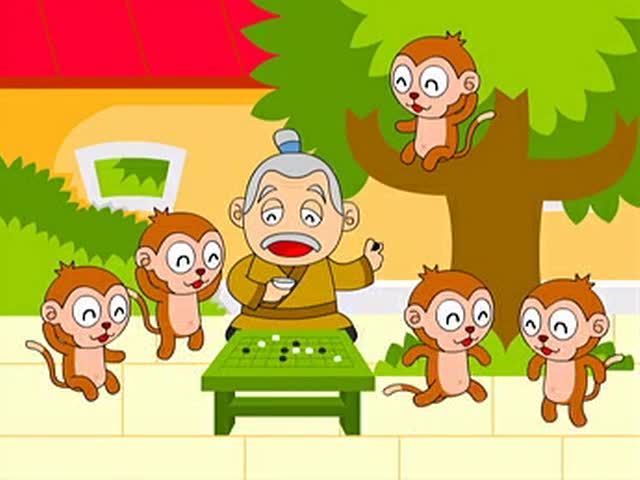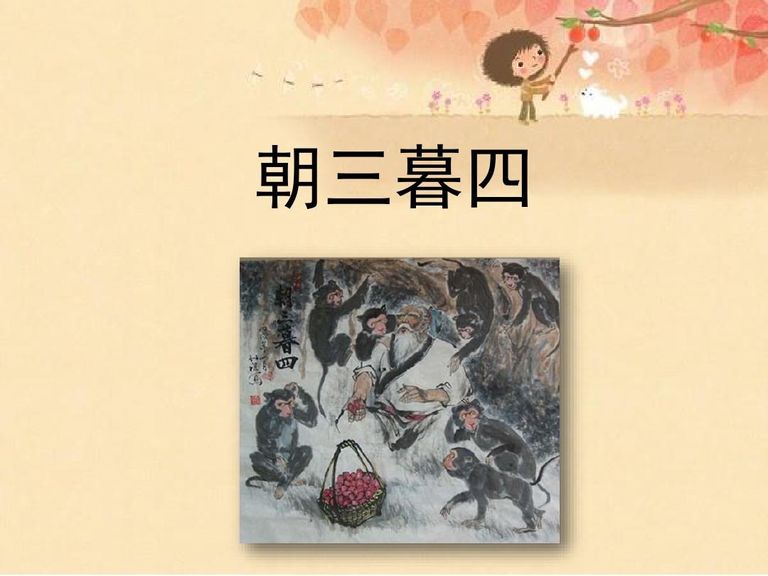
In the State of Song during the Warring States period, there was a man who raised many monkeys in his house, and everyone called him Jugong. Jugong understands the psychology of monkeys and communicates with them every day. Gradually, monkeys can also understand his words. Therefore, he doted even more on these small animals that could understand human language, often picking acorns that monkeys love to eat in the woods to satisfy their appetite.
One year, there was a famine in the village, and the fruits on the trees were almost depleted. Jugong had to reduce the food supply for the monkeys. But he was afraid that the monkeys would not be happy, so he discussed with them first. He said, "Starting tomorrow, I will give you three acorns in the morning and four in the evening, okay?" The monkeys heard that their food supply had decreased and stood up with bared teeth, showing a very angry expression. Jugong looked at this and immediately changed his mind, saying, "That's good. I'll give you four in the morning and three in the evening. That's enough to eat!" The monkeys heard that their food had already changed from three to four in the morning and thought that their food supply had increased. They all jumped happily.
Later on, people used the phrase “Three in the Morning and Four in the Evening” to metaphorically describe those petty people, satirizing the rulers of small states during the Spring and Autumn period and the Warring States period who, in order to survive and benefit, played tricks to deceive people, were fickle and did not mind moral losses.
The concept of “Three in the Morning and Four in the Evening” refers to humans rather than monkeys, but when we mention the fable, the first thing that comes to mind is monkeys. Monkeys are actually victims and fools, but they carry a negative reputation. Why is this happening? Probably due to the social environment at that time, it was not possible to openly satirize and criticize any person or group of people for fear of retaliation, so animals were used as a shield.
战国时期的宋国,有一个人在他家养了许许多多的猴子,大家都叫他狙公。狙公懂得猴子的心理,每日里与他们交流,渐渐地猴子也能听懂他的话。因此,他更加的疼爱这些能通人语的小动物,经常到林子中采摘些猴子爱吃的橡果,来满足猴子的食欲。
有一年,村子里闹了饥荒,树上的果子也被人几乎殆尽,狙公不得不缩减猴子的食粮。但他怕猴子们不高兴,就先和猴子们商量,他说:“从明天开始,我每天早上给你们三颗橡果子,晚上再给你们四颗,好吗?”猴子们听说他们的食粮减少,都咧嘴露牙的站了起来,表现出非常生气的样子。狙公看了,马上就改口说:“这样好了,我每天早上给你们四颗,晚上再给你们三颗,够吃了吧!”猴子们听说早上己经从三颗变成了四颗,以为食粮已经增加了,都高兴地跳跃起来。
后来人们便用”朝三暮四“来比喻那些反复无常的小人,讽刺了春秋战国的小国国君,为了生存与利益,玩弄手法欺骗人,反复无常,而并不介意道义上的损失。
“朝三暮四”的是人而不是猴子,可我们一提到“朝三暮四”寓言,首先想到的却是猴子,猴子实则是受害者、被愚弄者,却背上了骂名。为何会这样呢?大概是当时的社会环境所迫,不能明目张胆地讽刺批评哪个人、哪些人,怕遭到报复打击,只好拿动物来当挡箭牌了。
